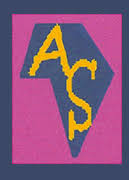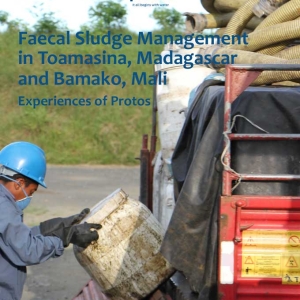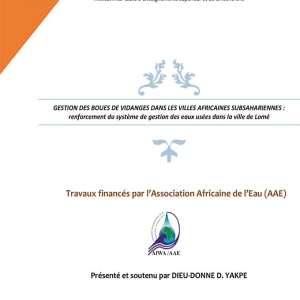Description
Le but de ce travail est de proposer une Station de Traitement de Boues de Vidange (STBV) pour l’assainissement des immeubles de plus de six (6) niveaux (S + R + 6) le long du fleuve Niger à Bamako.
Ainsi, nous proposons un système de traitement basé sur la décantation, le lagunage, l’infiltration/percolation, l’évaporation aboutissant à un compostage et un arrosage (ou épandage agricole).
Initialement expérimentée à Dioila en 2ème Région du Mali (sur financement du Programme Eau Potable Assainissement PEPA à travers l’ONG BORDA), la STBV est un nouvel ouvrage au Mali pouvant désormais servir à assainir les 21 immeubles recensés le long du fleuve Niger à Bamako. Son alimentation doit y reposer aisément sur la mise en place d’un réseau d’assainissement conçu au niveau de chaque immeuble. Sur la station pilote de Dioila, une stratégie d’analyses trimestrielle a été mise sur pieds. Pour ce faire, cinq (5) points de prélèvements ont été choisis.
Les résultats des analyses obtenus montrent que les boues de vidange de la station sont biodégradables avec un ratio moyen de la DCO/DBO5 de 1,52 au dernier point de prélèvement lors du dernier essai.
Les rendements épuratoires moyens pour la conductivité, le PH, le MES, l’Oxygène Dissous, la DCO, la DBO5, le NO3-, le PO43- et le NH4+ ayant respectivement donné 46,20 %, 12,40 %, 95,69 %, 78,18 %, 53,57 %, 37,5 %, 88,57, 74,61 %, 75 % et 47,46 % étalent donc clairement qu’une STBV peut bel et bien tenir pour la gestion des boues provenant directement des toilettes avec des résultats escomptés.
L’étude laisse par conséquent un grand champ de recherches à approfondir ou à expérimenter dans le temps et dans l’espace.
Mots-clés : assainissement, STBV, rejet dans le fleuve Niger, rendements épuratoires.
Experimentation of a faecal sludge treatment station for the sanitation of buildings of more than 6 levels along the Niger River in Bamako
The purpose of this work is to propose a Fecal Sludge Treatment Plant (FSTP) for the sanitation of buildings with more than six (6) levels (G + R + 6) along the Niger River in Bamako.
Thus, we propose a treatment system based on settling, lagoon treatment, infiltration/percolation, evaporation leading to composting, and
irrigation (or agricultural spreading).
Initially tested in Dioila, in the 2nd Region of Mali (funded by the Drinking Water and Sanitation Program, PEPA, through the NGO BORDA), the FSTP is a novel facility in Mali that can now be used to treat waste from the 21 identified buildings along the Niger River in Bamako.
Its operation depends on the establishment of a sanitation network designed for each building. At the pilot station in Dioila, a quarterly analysis strategy was implemented. For this purpose, five (5) sampling points were selected.
The analysis results show that the sludge from the station is biodegradable, with an average COD/BOD5 ratio of 1.52 at the last sampling point during the last test.
The average purification efficiencies for conductivity, pH, TSS, Dissolved Oxygen, COD, BOD5, NO3-, PO43-, and NH4+ were 46.20 %, 12.40 %, 95.69 %, 78.18 %,
53.57 %, 37.5 %, 88.57 %, 74.61 %, 75 %, and 47.46 % respectively.
These results clearly demonstrate that an FSTP can indeed be suitable for managing sludge directly from toilets with expected outcomes. Therefore, the study opens up a wide field of further research to be explored or experimented with over time and space.
Keywords : sanitation, FSTP, discharge into the Niger River, purification efficiencies







 AFWASA
AFWASA AAEA
AAEA
zoritoler imol –
I am curious to find out what blog platform you’re utilizing? I’m having some small security issues with my latest blog and I would like to find something more safe. Do you have any recommendations?